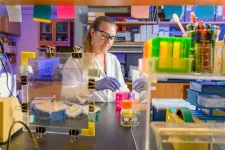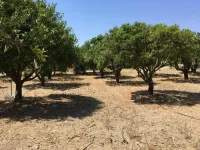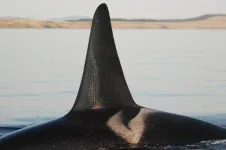(Press-News.org) Most women with ovarian cancer are diagnosed with the most advanced form of the disease. Less than a third of those diagnosed with the disease survive five years later. As the third most common type of gynecological cancer, it led to more than 200,000 reported deaths globally in 2020 alone, according to a recent study.
In a study published this month in the Journal of Experimental & Clinical Cancer Research, University of Notre Dame researchers in collaboration with NeoGenomics Laboratories have shed new light on one key factor that can make ovarian cancer especially deadly: obesity.
Obesity, considered a non-infectious pandemic, is known to increase the risk of ovarian cancer and decrease the likelihood of surviving the disease. A team of researchers led by M. Sharon Stack, the Ann F. Dunne and Elizabeth Riley Director of Notre Dame’s Harper Cancer Research Institute, and Anna Juncker-Jensen, senior scientist and director of scientific affairs at NeoGenomics, wanted to understand why obesity makes ovarian cancer more deadly.
The researchers analyzed cancer tumor tissues from ovarian cancer patients. They were able to compare the tissues of patients with a high body mass index (BMI) to those with a lower BMI, and two important differences stood out.
In cancer patients with a BMI higher than 30 (the range for obesity determined by the Centers for Disease Control and Prevention), the researchers found a particular pattern in the type of immune cells surrounding cancerous tumors. They found a change in the populations of a type of immune cells, called macrophages, infiltrating the tumor that are typically associated with more advanced cancer stages and poor survival.
The cancerous tumors in obese patients were also surrounded in more stiff, fibrous tissue known to help tumors resist treatment by chemotherapy. The team was also able to confirm their findings by observing similar patterns in ovarian cancer-bearing mice fed a high-fat diet.
Stack, who also serves as the Kleiderer-Pezold Professor of Chemistry and Biochemistry in the College of Science at Notre Dame, emphasized that the study offers hope for better treatments as the prevalence of obesity increases worldwide.
“Our data give a more detailed picture of how and why obesity may affect ovarian tumor progression and therapeutic responses to the cancer,” Stack said. “We are hopeful that these findings will lead to new strategies for targeted therapies that can improve outcomes for ovarian cancer patients.”
This study was supported by research grants from the National Institutes of Health, the National Cancer Institute, the National Institute on Aging, the American Institute for Cancer Research, the American Cancer Society and the Leo and Ann Albert Charitable Trust.
For more information on the Harper Cancer Research Institute’s work to increase the survival of all patients diagnosed with cancer, visit harpercancer.nd.edu.
END
Researchers reveal why obesity makes ovarian cancer more deadly
A new study links a high body mass index (BMI) to alterations in the structure and environment of cancerous tumors.
2023-07-20
ELSE PRESS RELEASES FROM THIS DATE:
Frontiers adopts CRediT to enhance clarity in research authorship
2023-07-20
Frontiers journals have adopted the Contributor Roles Taxonomy (CRediT) to improve the way authors' contributions to research are communicated and acknowledged. The new system replaces the conventional free-text authorship descriptions with a standardized and transparent system that ensures consistency and accuracy in recognizing individual contributions.
CRediT categorizes individual author contributions into well-defined roles and provides a clear, concise framework to describe the diverse contributions made by researchers ...
New findings show private equity investments in healthcare may not lower costs or improve quality of care
2023-07-20
A research team supervised by a health policy researcher at the University of Chicago has found that increasingly common private equity investments in healthcare are generally associated with higher costs to patients and payers. That’s according to a new study published July 19 in The BMJ. The study is thought to be the first systematic review of global private equity ownership trends in medical settings.
“Over the last few decades, private equity activity in healthcare has exploded, with financial institutions buying up hospitals, nursing homes and fertility ...
From chaos to light
2023-07-20
The transition to chaos is ubiquitous in nonlinear systems. Continuous-wave-driven photonic-chip-based Kerr microresonators exhibit spatiotemporal chaos, also known as chaotic modulation instability.
For more than fifteen years such modulation instability states have been considered impractical for applications compared to their coherent-light-state counterparts, such as soliton states. The latter have been the centerpiece for numerous high-profile application demonstrations, from long-range optical communication to photonic computing.
Now, researchers from the group of Tobias Kippenberg at EPFL have found a new way to harness the unique features of chaotic frequency combs to implement ...
UBC Okanagan researchers investigate new use for plastic bottles
2023-07-20
For years, unrecycled plastic bottles have been dumped in landfills. Now, thanks to new research from UBC Okanagan, those bottles may have a second life in that landfill—stabilizing its earth walls.
Used plastic bottles and textiles pose an increasing problem for landfills worldwide. Researchers say nearly a hundred million metric tons of polyethylene terephthalate (PET), also known as microplastics, are produced globally each year—with a fraction of that number being recycled—making it one of the largest sources of plastic waste.
“One ...
Bats struggle during organic farming transition
2023-07-20
Bat activity falls as farms make the transition to organic agriculture, new research shows.
Organic farming is better for biodiversity than conventional farming, which relies heavily on substances such as pesticides, herbicides and fertilisers.
However, little is known about how wildlife is affected by the transition period when a farm goes organic.
The new study, led by the universities of Bristol, Göttingen and Exeter, assessed the effects of organic farming by monitoring insect-eating bats at citrus ...
Male killer whales protected by post-menopause mothers
2023-07-20
Post-menopause female killer whales protect their sons – but not their daughters – from fights with other whales, new research shows.
Scientists studied “tooth rake marks” – the scarring left when one whale scrapes their teeth across the skin of another – and found males had fewer marks if their mother was present and had stopped breeding.
Only six species – humans and five species of toothed whales – are known to experience menopause, and scientists have long been puzzled about why this occurs.
The new study – by the universities ...
How eelgrass spread around the world
2023-07-20
Seagrasses evolved from freshwater plants and use sunlight and carbon dioxide (CO2) for photosynthesis and are able to thrive in depths down to 50 metres. In contrast to algae, they possess roots and rhizomes that grow in sandy to muddy sediments. The grass-like, leaf-shoots produce flowers and complete their life cycle entirely underwater. Seeds are negatively buoyant but seed-bearing shoots can raft, thus greatly enhancing dispersal distances at oceanic scale.
As a foundational species, eelgrass provides critical shallow-water habitats for diverse biotas and also provides numerous ecosystem services including carbon uptake. Seagrasses have recently been recognised as one of the important ...
PCORI makes first funding awards to advance the science on engaging patients, caregivers and other partners in health research
2023-07-20
WASHINGTON, DC – The Patient-Centered Outcomes Research Institute (PCORI) today announced the approval of $9 million for the first seven studies through its groundbreaking Science of Engagement initiative. An unprecedented research program dedicated to funding studies to demonstrate how best to engage patients, caregivers and other health care community members in comparative clinical effectiveness research (CER) and other health research, the initiative aims to grow a more robust evidence base to advance patient-centered, community-driven approaches to conducting research.
Since ...
New catalyst could dramatically cut methane pollution from millions of engines
2023-07-20
Individual palladium atoms attached to the surface of a catalyst can remove 90% of unburned methane from natural-gas engine exhaust at low temperatures, scientists reported today in the journal Nature Catalysis.
While more research needs to be done, they said, the advance in single atom catalysis has the potential to lower exhaust emissions of methane, one of the worst greenhouse gases, which traps heat at about 25 times the rate of carbon dioxide.
Researchers from the Department of Energy’s SLAC National Accelerator Laboratory and Washington State University ...
New resources to improve patient and public involvement in health research
2023-07-20
Patients and members of the public will be able to more easily take part in impactful research thanks to a new tool developed by the University of Birmingham’s work on Long COVID.
These resources are detailed in a paper published today in Nature Medicine from researchers working within the University of Birmingham’s Institute of Applied Health Research, the NIHR Birmingham Biomedical Research Centre (BRC) and NIHR Applied Research Collaboration West Midlands, reporting the evaluation ...
LAST 30 PRESS RELEASES:
This ancient plant-eater had a twisted jaw and sideways-facing teeth
Jackdaw chicks listen to adults to learn about predators
Toxic algal bloom has taken a heavy toll on mental health
Beyond silicon: SKKU team presents Indium Selenide roadmap for ultra-low-power AI and quantum computing
Sugar comforts newborn babies during painful procedures
Pollen exposure linked to poorer exam results taken at the end of secondary school
7 hours 18 mins may be optimal sleep length for avoiding type 2 diabetes precursor
Around 6 deaths a year linked to clubbing in the UK
Children’s development set back years by Covid lockdowns, study reveals
Four decades of data give unique insight into the Sun’s inner life
Urban trees can absorb more CO₂ than cars emit during summer
Fund for Science and Technology awards $15 million to Scripps Oceanography
New NIH grant advances Lupus protein research
New farm-scale biochar system could cut agricultural emissions by 75 percent while removing carbon from the atmosphere
From herbal waste to high performance clean water material: Turning traditional medicine residues into powerful biochar
New sulfur-iron biochar shows powerful ability to lock up arsenic and cadmium in contaminated soils
AI-driven chart review accurately identifies potential rare disease trial participants in new study
Paleontologist Stephen Chester and colleagues reveal new clues about early primate evolution
UF research finds a gentler way to treat aggressive gum disease
Strong alcohol policy could reduce cancer in Canada
Air pollution from wildfires linked to higher rate of stroke
Tiny flows, big insights: microfluidics system boosts super-resolution microscopy
Pennington Biomedical researcher publishes editorial in leading American Heart Association journal
New tool reveals the secrets of HIV-infected cells
HMH scientists calculate breathing-brain wave rhythms in deepest sleep
Electron microscopy shows ‘mouse bite’ defects in semiconductors
Ochsner Children's CEO joins Make-A-Wish Board
Research spotlight: Exploring the neural basis of visual imagination
Wildlife imaging shows that AI models aren’t as smart as we think
Prolonged drought linked to instability in key nitrogen-cycling microbes in Connecticut salt marsh
[Press-News.org] Researchers reveal why obesity makes ovarian cancer more deadlyA new study links a high body mass index (BMI) to alterations in the structure and environment of cancerous tumors.






